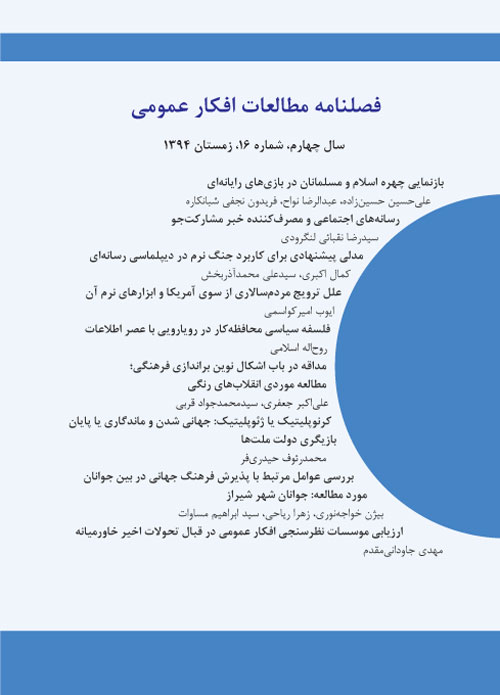فهرست مطالب
فصلنامه مطالعات افکار عمومی
پیاپی 2 (تابستان 1391)
- تاریخ انتشار: 1391/08/01
- تعداد عناوین: 8
-
صفحه 29
-
صفحه 141
-
Page 29The present research seeks to answer the questions, “what is the nature of state from the viewpoint of Islam?” and “is there any need for the establishment of state in Islam, or is it based on religious values?” To answer these questions, first the relationship between religion and politics is discussed. Also state is defined and the concept of state in Islam is studied. Then the reasons for the establishment of state in Islam are analyzed, and the establishment and structure of city state at the time of Prophet Mohammad (S) is examined. State at the era of the Absence of Imam Mahdi (S) is discussed as well. Finally, the objectives and main characteristics of state from the viewpoint of Islam are studied.Keywords: state, the necessity of state, Prophet Mohammad (S), Vilayat Faqih, Islam
-
Page 51The perfect man possesses all possible perfections, is the manifestation of all divine attributes and reveals this harmony better than other creatures. In the Battle of Uhod, in spite of suffering severe hardship, Prophet Mohammad (S) declined to curse the enemies who had caused the suffering, and said “I am not sent as a prophet to curse, I am sent to call unto God and disseminate blessing”. In his prayer Prophet Mohammad (S) asked God to “guide the people to truth, because they are ignorant”. The perfect man has been described in different ways: Buddha calls him “Irhat” and Confucius attributes the name “Kyun Tsu” to him. In Yoga and Behakati he is called the “free man”. Plato calls him “philosopher”, Aristotle names him “dignified man” and Nietzsche gives the name “superman” to him. In Islamic mysticism and Sufism different names are given to the prefect man: Qutb al-Aqtab, Ghawth al-Azam, jame’ Caliph Allah and the like. In Islam, especially mysticism, human is of greater importance than others beings in the universe; he is placed higher than other beings, even angels and Cherubim. Therefore, in Islamic mysticism, the concepts of man and perfect man, after the concept of Oneness of Being, as the main subject of mysticism, are of greatest importance. Most discussions of Islamic mysticism center on Divine Oneness and its states, the holder of the state of oneness among creatures and the true monist, i.e. man.Keywords: anthropology, perfect man, humanism, mysticism
-
Page 77The Islamic Republic of Iran, for the first time, provided a fully qualified Faqih, who had established a political system himself, with the opportunity to present his ideas about different human rights issues on the basis of Fiqh and Islamic principles. Imam Khomeini utilized Fiqh and Islamic principles to express his ideas about important human rights issues, such as freedom and the Islamic political society. The present article seeks to discuss the status of freedom, obstacles in the way of securing freedom, and the manifestations of freedom using the ideas and views of Imam Khomeini about human rights.Keywords: Imam Khomeini, the concept of freedom, obstacles to freedom, types of freedom, manifestations of freedom
-
Page 99Although soft power, as a new interpretation of power in the arena of human relationships, is as old as the collective life of human beings, it is a new concept. Culture, which can both threaten and strengthen the social system, along with economy and politics, is one of the most important sources of soft power. Culture-based identity is the target ofsoft power because its nature can determine individual and collective behavior of human beings. Culture and cultural identity as sources of soft power, experience changes in the process of globalization; this paper seeks to examine the weaknesses and strengths of soft power, and the opportunities and threats that it encounters in the process of globalization, through revision and analytical method.Keywords: culture, soft power, cultural identity, globalization
-
Page 117The Islamic Republic of Iran can be regarded as the manifestation of the fulfillment of soft power in the sense of the ability to influence others without posing any threats or paying a considerable cost. The cultural achievements of the Islamic Revolution have played a key role in the production of soft power. At the domestic level, the revitalization of Islam, self-confidence, the enhancement of awareness among people, the development of unity between university and Hawzah (religious school) and the revitalization of the culture of ritual prayers and Islamic principles are among the most important achievements of the Islamic Revolution; and at the international level the revitalization of religion and Islamic values and traditions are of great importance. This cultural movement, which emphasizes the importance of Islamic convergence and the establishment of a global pole for Islam, has played a vital role in resisting the cultural invasion of the West. The present paper deals with the cultural soft power of the Islamic Revolution and the pathology of soft power, and seeks to study the ways of countering cultural invasion.Keywords: culture, Islamic Revolution, soft power, cultural invasion, cultural engineering
-
Page 141The relationship between the individual and the society is one of the most important issues, which is of special significance in all the fields of knowledge that deal with “human being”. Islamic philosophy, in its normative aspect, highlights the importance of the attainment of happiness for human beings, and considers man to be a social being which needs to establish a healthy social relationship in order to attain happiness. On the other hand, psychotherapy, as a field of science, attaches great importance to the social aspect of man, and considers love and friendship to be symbols of the humanity of the individual which are necessary for the state of health of mind and soul, and a healthy society.Keywords: Islamic philosophy, psychotherapy, friendship, love


